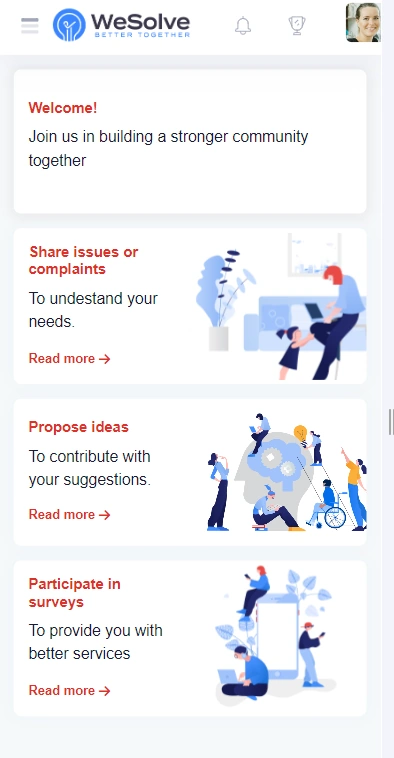Case Study
METROFOOD-IT
WeSolve Empowers Multi-Stakeholder Co-Creation


Co-Creation Activities
Research Institutions
Different Stakeholders
Italy
Projects Timeline
2022-2023
Key features
Multi-Stakeholder Management
Co-Creation & Collaboration
Acceletated Innovation
Feedback Collection
Decision-making
Table of Contents
1
Background
With the multiple stakeholders of METROFOOD-IT, such as research institutions, businesses, and citizens, effective co-creation methods are essential to advance shared goals in sustainability, efficiency, and digital transformation. Without a structured platform for co-creation, stakeholders encounter barriers to communication, inefficiencies in gathering actionable feedback, and difficulties in decision-making. These issues limit the sector’s capacity to achieve digitalization and sustainability goals, hindering innovation and the reliability of agro-food systems.
2
Challenge
The agro-food sector faces critical challenges in managing stakeholder collaboration, ensuring data traceability, and fostering innovation within a highly complex ecosystem. Inefficient collaboration leads to slower innovation cycles, reduced competitiveness in the market, and missed opportunities to enhance data reliability and cost-efficiency. Stakeholders may have difficulty aligning on strategic priorities, which could impact the overall effectiveness of research and development projects like METROFOOD-IT, an Italian research infrastructure funded under the National Recovery and Resilience Plan (PNR).

Founded in 2012, BI Network (www.binetwork.it) has emerged as a leader in developing software applications and providing consulting services, in particular BI & Analytics and Web Development. With offices in Milan and Turin, the company serves clients in Italy and across the globe, either directly or through collaborations with renowned consulting firms. Their team of skilled professionals is dedicated to delivering tailored solutions in data management, analytics, and web development.



3
Solution
WeSolve addresses these challenges by providing a comprehensive suite of tools tailored to co-creation activities. Feedback collected through the platform is organized using proven methodologies such as Kanban, Six Thinking Hats, Brainstorming, and Consensus Building. This enables stakeholders to visualize workflows, explore diverse perspectives, generate inclusive ideas, and align on unified decisions.
The METROFOOD-IT’s co-creation initiatives are bringing together:
- Private Businesses: Innovators and industry leaders.
- Research Organizations: ENEA (Italian National Agency for New Technologies, Energy, and Sustainable Economic Development), INRIM (National Institute for Metrological Research), UNIBA (University of Bari), UNIMOL (University of Molise), UNINA (University of Naples Federico II), UNIPR (University of Parma), UNIROMA (University of Rome), and UNISI (University of Siena) – Santa Chiara Laboratory.
- Civil Society: To ensure inclusivity and participation
By adopting WeSolve, businesses and research institutions fostered collaboration, improved decision-making, and accelerated innovation, driving the agro-food sector toward a sustainable and competitive future.

Simone Cresti
“By adopting WeSolve, METROFOOD-IT fostered collaboration, improved decision-making, and accelerated innovation, driving the agro-food sector toward a sustainable and competitive future."
4
Implementation process
The deployment of WeSolve involved a strategic, step-by-step process focusing on improved collaboration, accelerated innovation, feedback collection and data-driven decision-making to enhance muliti-stakehodler co-creation.
1
Stakeholder Engagement
Encouraged active participation and involvement across sectors.
2
Barrier Removal
Focused on breaking down barriers of communication, inefficiencies in gathering actionable feedback.
3
Sustainability
Promoted eco-friendly and socially responsibles practices.
4
Actionable Feedback
Established efficient gathering of actionable feedback collected through proven methodologies.
5
Action Plans
Based on the collected feedback, actionable plans were developed to address stakeholder challenges.
6
Ecosystem Support
Inclusion of Private Business, Research Institutions and Civil Society, ensured effectivenss of the research and development project.
5
Results
By leveraging WeSolve’s tools, the project contributes to the circular bioeconomy, reduces costs, and improves data usability for a broad audience, including local authorities, policy makers, businesses, and civil society.
Enhanced Collaboration
Smoother communication among cross-sector stakeholders.
Accelerated Innovation
Improved collaboration leads to quicker innovation cycles.
Aligned Decision-making
More transparent idea collection, feedback and workfl
Reliable Agro-food Systems
Enhancing the reliability of agro-food systems, ensuring data-tracability within a complex ecosystem.
6
Conclusions
WeSolve’s platform not only enhanced collaboration but also empowered the involved businesses and stakeholders to deliver on their goals of fostering innovation, ensuring data reliability, and creating a sustainable ecosystem.
WeSolve’s commitment to sustainability aligns with METROFOOD-IT’s mission to promote research and innovation in the agri-food sector by providing integrated services, accelerating the digitalization of agri-food systems and their efficiency, traceability, and sustainability.
Together, these efforts enhance the reliability of products and processes and improve the information provided to citizens, local authorities, and all stakeholders of the agri-food systems. These collaborative initiatives are shaping the future of food systems in Italy, Europe, and beyond.
